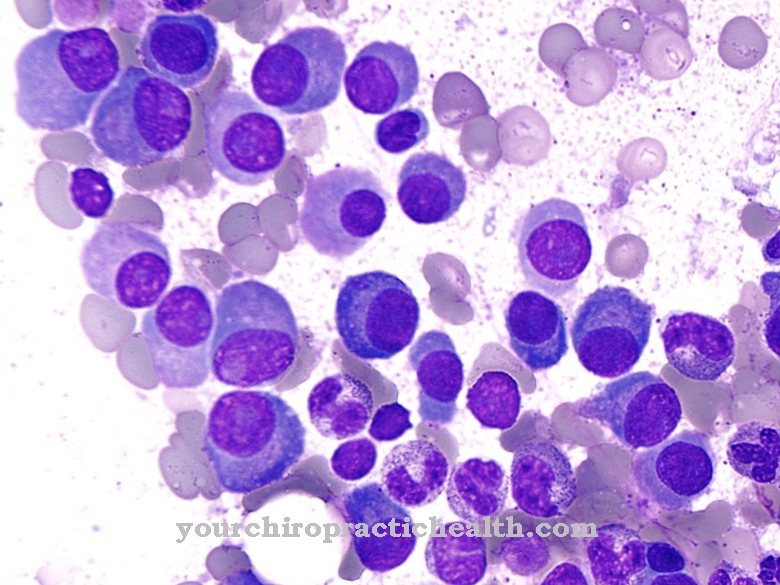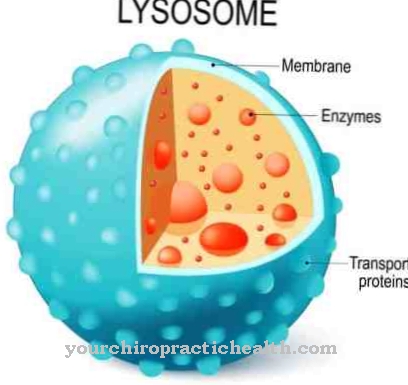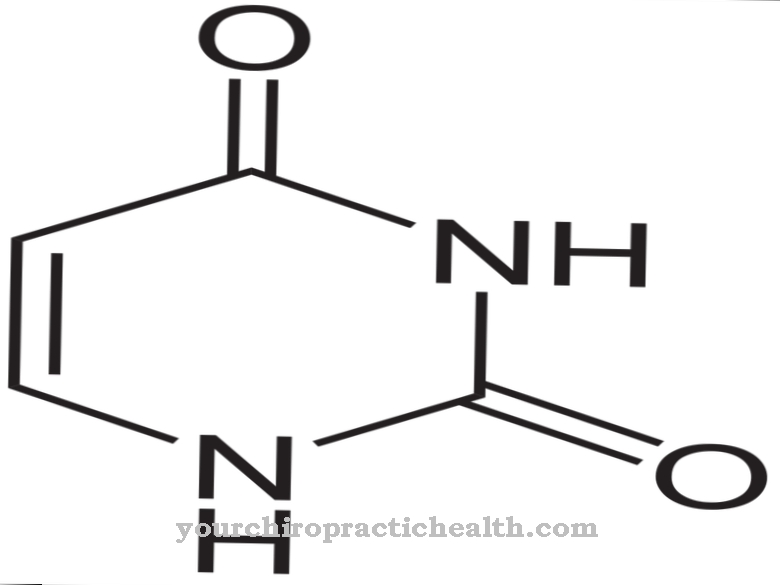Lymphocytes As a subgroup of leukocytes (white blood cells) play a central role in the immune defense against foreign substances, especially infectious agents, as well as pathogenically modified cells of the human organism such as tumor cells. An increased or decreased concentration of lymphocytes in the blood usually indicates a disease.
What are lymphocytes

Lymphocytes are the smallest representatives of the leukocytes and are the most important carriers of the adaptive (acquired) immune system of the human organism. In addition to the blood plasma, about 45 percent of the human blood is composed of blood cells, which are found in leukocytes (white blood cells) and erythrocytes (red blood cells ) and thrombocytes (blood platelets).
In general, a differentiation is made between B and T lymphocytes and NK cells. In an adult human, 1000-2900 lymphocytes per µl blood or 17-47 percent of the proportion of white blood cells are considered normal.
Most of the lymphocytes do not circulate in the bloodstream, but are located in the bone marrow and in the organs of the lymphatic system (thymus, tonsils, spleen, Peyer's plaques of the intestinal tract, lymph nodes). An increased or decreased number of lymphocytes can indicate different diseases.
Medical & health functions, tasks & meanings
Depending on the type of ripening, the Lymphocytes divided into B and T lymphocytes and NK cells. The B cells (derived from bone marrow for bone marrow or the Bursa Fabricii in birds, in which the B lymphocytes were first discovered), which begin their maturation process in the bone marrow, are able to produce antibodies (defense substances) to produce and secrete, which neutralize specifically soluble antigens classified as foreign (including bacteria, released toxins).
For this purpose, the inactive B-lymphocytes circulate in the lymphatic system or bloodstream and are activated as soon as an antigen docks with the immunoglobulins on the surface, the antigen receptors of the B-cells. The B cell takes up the antigen, breaks it down and expresses it as a protein complex that is identified by the T helper cells (subgroup of T lymphocytes). In addition, the T helper cells synthesize cytokines that activate the B lymphocytes, which then proliferate (divide) in the lymph nodes or the spleen.
In addition, a smaller proportion of the B lymphocytes differentiate into long-lived B memory cells that store the antigen information in order to ensure a prompt and effective immune response in the event of further contact with the specific antigen.
The T lymphocytes, which mature in the thymus, identify foreign particles (including antigens such as viruses, intracellular bacteria, cells modified by mutations) that can have a damaging effect on the organism, and prepare the corresponding cells for the immune system in order to ensure a quick and targeted defense against the identified pathogens.
The NK cells, the natural killer cells, primarily recognize modified endogenous cells such as virus-infected cells or tumor cells and trigger apoptosis, the programmed cell death, in these cells.
Illnesses, ailments & disorders
A pathological increase (lymphocytosis) or decrease (lymphopenia) in the number of lymphocytes can be attributed to different causes. A decreased or increased number Lymphocytes, which is determined as part of a differential blood count with determination of all subtypes of leukocytes in the blood, indicates a possible disease.
An increase in lymphocytes and leukocytes in the blood generally correlates with inflammation or infection. Viral droplet infections (including influenza, measles, rubella, mumps, chickenpox), contact and smear infections (herpes simplex, diarrhea, hepatitis A and E, polio, Ebola,]] yellow fever]], HIV, cytomegaly), bacterial infections (brucellosis, Tuberculosis, typhoid fever, pertussis or whooping cough) as well as various tumor diseases (leukemia, lymphomas) are associated with an increased concentration of lymphocytes in the blood.
Hyperthyroidism (overactive thyroid gland), Guillain-Barré syndrome (progressive impairment of the nervous system) or sarcoidosis or Boeck's disease, an inflammatory disease and granulomatosis (focal accumulation of granulomas), which predominantly affects the lungs, can lead to increased lymphocyte count. Cause value.
On the other hand, chemotherapy and / or radiation therapy, cortisone or cytostatic therapy or treatment with immunosuppressants, as well as an increased cortisol concentration (hypercortisolism), for example as a result of Cushing's syndrome, can cause a decreased lymphocyte level in the blood.
In addition, autoimmune diseases (e.g. pronounced systemic lupus erythematosus or myasthenia gravis), various cancers (including Hodgkin's disease or lymph gland cancer), uremia (urinary poisoning in the end stage of kidney failure) and AIDS can result in decreased lymphocyte concentration in the blood.
You can find your medication here
➔ Medicines to strengthen the defense and immune system



.jpg)























